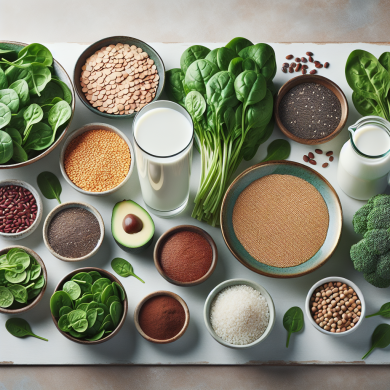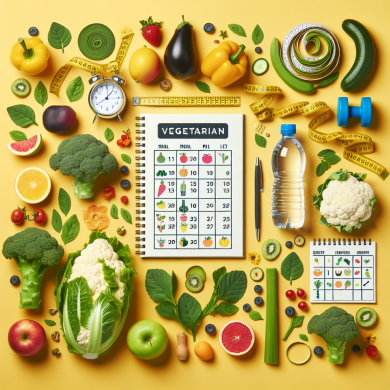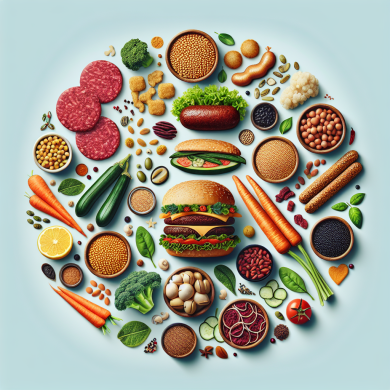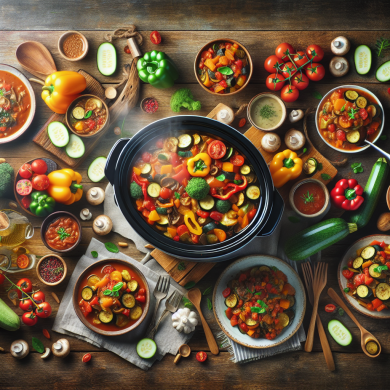Top Vegetarian Protein Sources for Optimal Health
Maintaining a balanced diet rich in protein is vital for overall health, as proteins are the building blocks of the body. For vegetarians, finding diverse and complete protein sources can be a challenge, but with the right knowledge, it’s entirely achievable. This article explores the top vegetarian protein sources that contribute to optimal health.
The Importance of Protein in a Vegetarian Diet
Proteins are essential macromolecules that play a critical role in building and repairing tissues, producing enzymes and hormones, and supporting immune function. For vegetarians, obtaining all essential amino acids from plant-based sources requires a strategic approach, as most plant proteins are incomplete, lacking one or more essential amino acids.
Legumes: The Powerhouse of Plant Protein
Lentils
Lentils are a staple in many vegetarian diets and for good reason. They are rich in protein, fiber, and essential nutrients such as iron and folate. A single cup of cooked lentils provides about 18 grams of protein, making them an excellent meat substitute. Lentils are also versatile, finding a place in soups, stews, salads, and even burgers.
Chickpeas
Chickpeas, also known as garbanzo beans, are another fantastic source of vegetarian protein. They offer approximately 15 grams of protein per cooked cup. Beyond protein, chickpeas are packed with fiber and are low in calories, which aids in maintaining a healthy weight. Popular dishes include hummus, falafel, and curries.
Black Beans
Black beans are celebrated not only for their protein content — about 15 grams per cooked cup — but also for their dense nutritional profile, including high levels of fiber and antioxidants. They can be used in a variety of dishes, from tacos and burritos to soups and salads.
Nuts and Seeds: Compact Nutrient Powerhouses
Almonds
Almonds are rich in protein, healthy fats, and vitamin E. A quarter-cup serving of almonds provides roughly 7 grams of protein. They can be consumed raw, roasted, or in the form of almond butter, making them a convenient snack or addition to meals.
Chia Seeds
Chia seeds are a remarkable source of protein and are also rich in omega-3 fatty acids, fiber, and antioxidants. Two tablespoons of chia seeds contain around 4 grams of protein. They can be added to smoothies, yogurts, and baked goods, or used to make chia pudding.
Quinoa
Often mistaken for a grain, quinoa is actually a seed that offers complete protein, containing all nine essential amino acids. A cooked cup of quinoa provides about 8 grams of protein. Its versatility allows it to be used as a base for salads, bowls, or as a side dish.
Whole Grains: A Foundation for a Balanced Diet
Oats
Oats are more than just a comforting breakfast option; they are a good source of protein with about 6 grams per cup of cooked oats. They also provide important nutrients like fiber and magnesium. Oats can be enjoyed in traditional oatmeal, smoothies, and baked goods.
Brown Rice
Brown rice, a whole grain, offers about 5 grams of protein per cooked cup. It is rich in fiber and essential minerals like manganese and magnesium. Brown rice serves as a great base for stir-fries, grain bowls, and casseroles.
Dairy and Dairy Alternatives: Protein with Calcium Benefits
Greek Yogurt
Greek yogurt is a protein-rich dairy product, providing up to 10 grams of protein per 100-gram serving. It is also an excellent source of calcium and probiotics, supporting bone health and digestion. Greek yogurt can be consumed on its own or as a base for smoothies and desserts.
Tofu
Tofu, made from soybeans, is a versatile protein source that offers about 8 grams of protein per 100-gram serving. It can be used in a variety of dishes, from stir-fries to soups and salads. Tofu is also rich in calcium and iron, making it a valuable addition to any vegetarian diet.
Tempeh
Tempeh, like tofu, is made from soybeans but is fermented, which enhances its nutritional profile and digestibility. It provides about 19 grams of protein per 100-gram serving and is packed with probiotics. Tempeh is perfect for grilling, sautéing, and adding to sandwiches or salads.
Vegetables: Surprising Sources of Protein
Broccoli
Broccoli is not only a rich source of vitamins and minerals but also provides a decent amount of protein, about 3 grams per cup. It can be steamed, roasted, or added to stir-fries and salads, contributing to a balanced vegetarian diet.
Spinach
Spinach is another vegetable that offers a noteworthy amount of protein, with about 5 grams per cooked cup. It is also high in iron, calcium, and vitamins A and C. Spinach can be used in smoothies, salads, or cooked dishes.
Conclusion
Incorporating a variety of these vegetarian protein sources into your diet ensures you receive all the essential amino acids and nutrients necessary for optimal health. By understanding and utilizing these diverse options, vegetarians can meet their protein needs effectively and enjoy a balanced, nutritious diet. Remember, balance and variety are key to maintaining a healthy vegetarian lifestyle.















Add comment